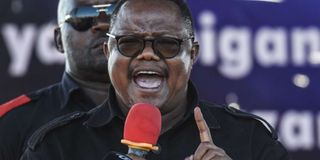Premium
Tundu Lissu explains strong opposition following in Tanzania

Tanzania’s Chadema presidential candidate Tundu Lissu.
What you need to know:
- He said the strong grassroots organisation created by his party during the last five years is the secret behind the large turnouts.
- Lissu has been attracting a large crowds of enthusiastic supporters.
- He promised to lower interests on loans from 15 per cent to three per cent.
Dar es Salaam
Tanzania’s Chadema (Chama cha Demokrasia na Maendeleo) presidential candidate Tundu Lissu has said the opposition in has continued to grow in strength despite facing crippling hurdles over the years.
Lissu Saturday said the euphoric campaigns by Augustine Mrema in 1995 and former premier Edward Lowassa in 2015 gave them valuable lessons that inform their current movement.
He said the strong grassroots organisation created by his party during the last five years is the secret behind the large turnouts.
Chadema says the clampdown on political activities was a blessing in disguise as they took the better route to energise their support base.
He was speaking during a media briefing in Mwanza before embarking on the second leg of his campaigns. He was asked to explain reasons behind his energised campaign and what difference it will make with similar enthusiasm in the past elections.
Large crowds
The former Singida East MP and Tanganyika Law Society (TLS) president has been attracting a large crowds of enthusiastic supporters.
In Bunda Saturday, they braved and danced in the rain as he made entry into the area. He has so far campaigned in Coast, Morogoro, Iringa, Njombe, Mbeya, Songwe, Rukwa, Katavi, Kigoma, Kagera, Geita and Mwanza.
Debate on social media has been on how the party managed to keep its following despite restrictions on political activities.
Although the government’s clarifications that the restrictions were aimed at providing enough time to implement development projects, the opposition politicians and other commentators felt it was aimed at weakening the parties.
A series of cases were filed against leaders of the main opposition parties that saw nine of them from Chadema sentenced to five months in prison or pay a total of Sh350 million in fine after they were found guilty of holding an illegal assembly and demonstrations.
Those found guilty by the Kisutu Resident Magistrate’ Court included party’s chairman Freeman Mbowe, former secretary Dr Vincent Mashinji and his deputies for Mainland and Zanzibar John Mnyika and Salum Mwalimu Juma respectively.
Dr Mashinji later defected to CCM, Mnyika succeeded him and Mr Mwalimu was picked by Mr Lissu as his running mate.
Well-wishers contributed to pay the hefty fines.
“We properly used the government’s restrictions to build a strong countrywide organisation that enables us to have agents throughout the country during this year’s elections, something that we couldn’t in the past,” Mr Lissu told journalists Saturday.
Media blackout
According to him, the grassroots mobilisation has helped them survive a media blackout.
“That is what differentiates us and previous presidential contestants who couldn’t protect their victories. We are sure to have many supporters in every district as well as regions,” he said.
Mr Lissu pledged widespread reforms to ensure the people’s rights and freedoms are respected if elected. He promised to compensate all victims of what he described as “injustice” committed against them such as demolitions, unfair sacking of public servants and prejudicial trials.
“We’ll reduce administration costs and reform regional and local authorities’ bureaucratic legacy,” he said.
He reiterated that his administration will allow free travel all over the world in order to bring wealth back home and attract more investors who will stimulate business and trade in order to create jobs and provide money to citizens.
He promised to lower interests on loans from 15 per cent to three per cent.
According to him, no demolition of houses will be done if citizens cannot be given other houses.
He said taxes charged for building materials will be lowered in order to cut its prices.




